It’s important to remember that the term “space opera” was first devised as an insult.
This term, dropped into the lexicon by fan writer Wilson Tucker, initially appeared in the fanzine Le Zombie in 1941. It was meant to invoke the recently coined term “soap opera” (which then applied to radio dramas), a derogatory way of referring to a bombastic adventure tale with spaceships and ray guns. Since then, the definition of space opera has been renewed and expanded, gone through eras of disdain and revival, and the umbrella term covers a large portion of the science fiction available to the public. It’s critical opposite is usually cited as “hard science fiction,” denoting a story in which science and mathematics are carefully considered in the creation of the premise, leading to a tale that might contain more plausible elements.
This had led some critics to posit that space opera is simply “fantasy in space.” But it isn’t (is it?), and attempting to make the distinction is a pretty fascinating exercise when all is said and done.
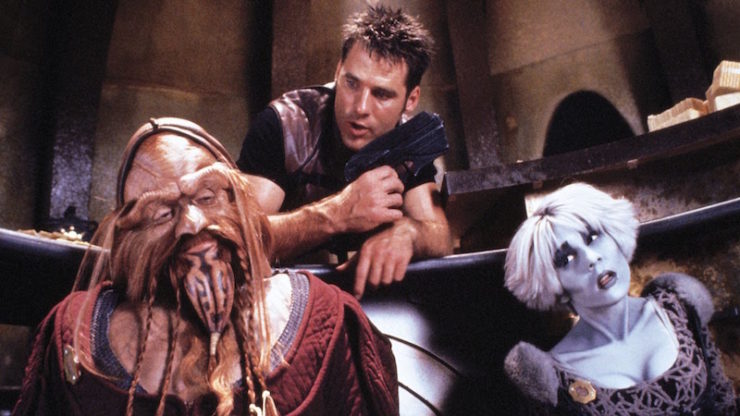
Of course, if you are the sort of person who terms anything with a fantastic element as fantasy, then sure—space opera falls into that sector. So does horror and magical realism and most children’s books and any other number of sub-genres. The answer as to how much any given qualifier for a sub-genre truly “matters” is always up for debate; pairing it all down until your favorite stories are nothing but sets of rules is a tasking journey that no mortal deserves to suffer through. What does it matter, right? We like the stories that we like. I prefer adventurous stories with robots and spaceships and aliens, and nothing else will ever be as good to me. I enjoy the occasional elf, and I love magic, and fighting against a world-ending villain can be great sometimes. I also adore it when real-world science is applied lovingly to a fictional framework. But if I don’t get my lasers and my robots and poorly considered space wardrobes in regular doses, the world will not turn properly.
Which means that something about the genre is distinct—so what is it? Highlighting the variations can make a heaping difference in helping people explain what they enjoy in fiction, and to that end, the definition of space opera has had quite a journey in the popular lexicon.
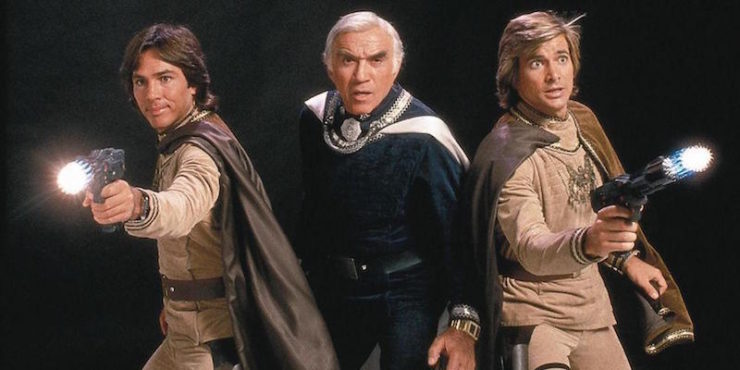
To start, a word from The Space Opera Renaissance, written by David Hartwell and Kathryn Cramer. Their book defines the genre as “colorful, dramatic, large-scale science fiction adventure, competently and sometimes beautifully written, usually focused on a sympathetic, heroic central character and plot action, and usually set in the relatively distant future, and in space or on other worlds, characteristically optimistic in tone. It often deals with war, piracy, military virtues, and very large-scale action, large stakes.”
Plenty of those ideas apply in a wide spread of fantasy tales, particularly epic fantasy; central hero, war and military virtues, colorful and dramatic yarns, large-scale action and stakes. The trappings are still different in space opera, with stories set in the far future, and the use of space travel and so forth. But what about that optimism? It’s an interesting stand out, as is the tendency toward an adventure narrative. Epic fantasy can end happily and be adventurous at times, but it often doesn’t read with a plethora of either of those traits. The Lord of the Rings is harrowing. A Song of Ice and Fire is full of trauma and darkness. The Wheel of Time turns on minute detail and precise depictions of a world that has been thought through in every aspect. Fantasy lends itself to extreme specificity and worlds in turmoil—space opera doesn’t have to in order to work.
What’s more fascinating is that the comparison to fantasy is relatively new in the history of space opera’s existence as a genre. In fact, what it used to be compared to was the “horse opera”… that is, Westerns. Here is the back cover of the first issue of Galaxy Science Fiction from 1950:
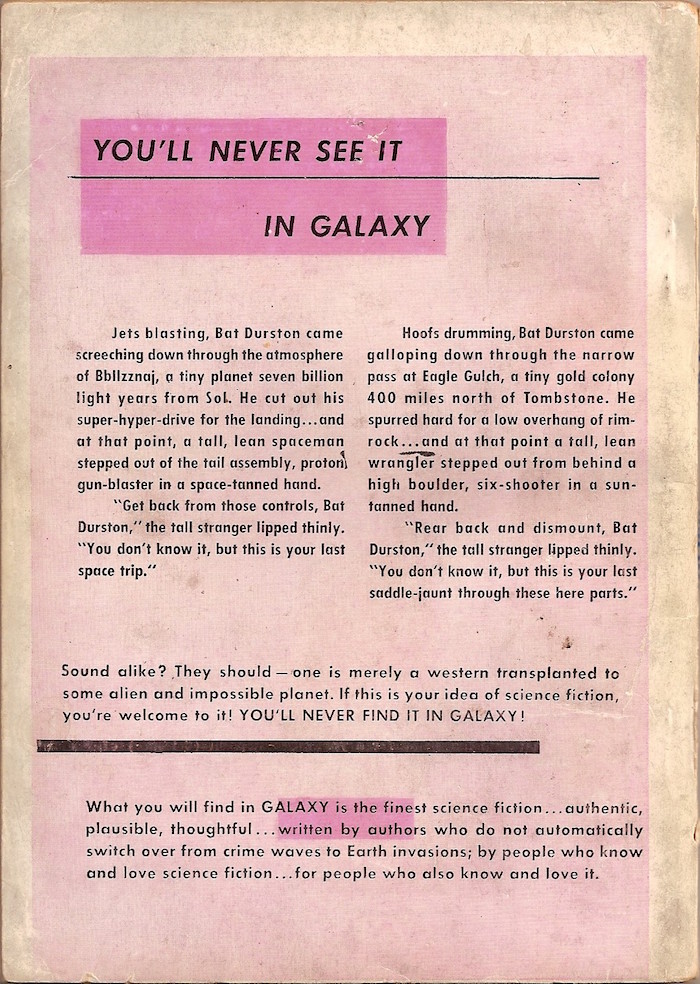
Whoa. Outside the fact that this copy is throwing some serious shade, we can glean a better sense of what space opera meant to many seven decades ago, and how it was viewed. And what it reveals is perhaps a larger problem: why has space opera always been compared to other genres throughout its history? Why can’t it just be considered its own thing?
The macrocosm answer is simple enough: stories are stories. They all rely on similar devices, tropes, and narrative styles. There is very little that sets one genre apart from another in the broadest sense, and that’s perfectly fine. The microcosm answer is more complex: space opera used to be an insult, and it has taken years and the advent of incredibly successful space operas—like Star Wars and the Vorkosigan Saga and the Culture series—to allow it to stand on its own. But perhaps all those years of hanging out in the shadows has made fans more hesitant in parsing out what they love about the genre.
So what is it?
As a fan of the genre, I find the Western comparison hilarious because Westerns are very much not my thing. So what makes the difference? Why are aliens and robots important? Why are ray guns and space travel better than horses and six-shooters? There’s a part of me that wants to argue for introspection in that vein; robots and aliens are often used as a way to examine aspects of human nature, to dissect ourselves by using other beings as a template. Dwarves and orcs can do this too, but seem a bit more earth-bound, whereas robots and aliens are a part of our future—they ask questions about where we might go, what challenges we might face as we evolve.
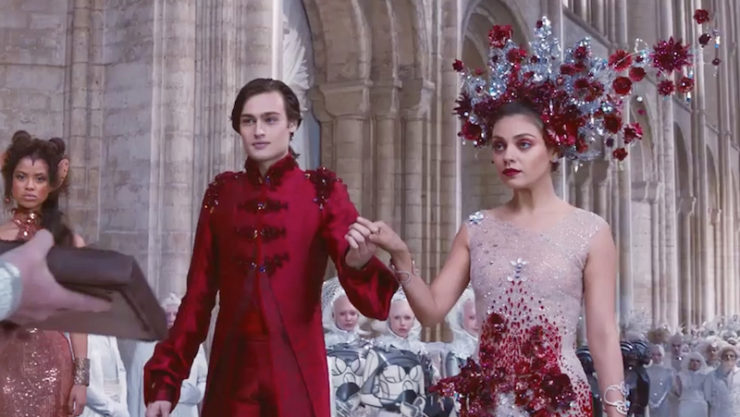
But there’s also the “opera” part of space opera, something that doesn’t get enough credit in the phrase. After all, labeling something an opera creates a very specific expectation in the mind of your audience. It grants your story scale, yes, but not just in terms of set pieces and costumes. Opera is all about performance, about emotion. Operatic stories are bursting with feelings that can only be spelled out in all-caps. You don’t need a translation of an opera to understand it because the spectacle of it should transcend the need. Opera works with visuals, music, dance, poetry, as many forms of art as we can shove into a collective space and time. Opera is bigger than all of us.
Space operas often deliver on those terms. They are writ large and bursting with color and light. Perhaps that is the distinction worth making in the quest to explain its pull as a genre. Taking the opera out of space opera leaves us with… space. Which is great! But I don’t want to spend most of my musings on space marveling at the use of silence in Gravity. Space needs a little melodrama. It needs an opera.
Is space opera just fantasy in space? To each their own on that definition. But there’s a difference between the two all the same, and even if we don’t need to pin it down, we can at least honor the fact that space opera is no longer an insult—it encompasses many of the stories that we treasure.
Emmet Asher-Perrin has been asking for a robot friend and an alien friend since childhood. You can bug her on Twitter and Tumblr, and read more of her work here and elsewhere.










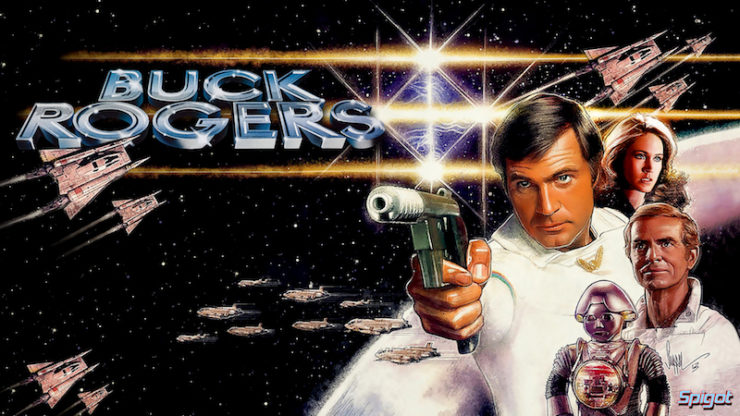
Opera is the key word for Space Opera for me. The melodrama, the larger than life characters, setting, plot. You nail it on the head, Emily :)
I’ve often thought of “space fantasy” as a subset of space opera as a whole. Buck, Flash, and similar were definitely more in the “fantasy” camp when they were first published. And they’re definitely space opera (Flash might even be a hat trick, since his original stories are also Planetary Romance).
These days, space opera includes a lot of exploratory scifi, military scifi and more “hard” scifi where the writers strive for a certain level of scientific accuracy–or at least realistic believably. Now, with the re-emergence of Star Wars and Guardians of the Galaxy, we’re seeing space fantasy S.O. make a big comeback.
It’s always been an elusive genre to define, but I think it includes more than it excludes.
I find it ironic that you throw Star Wars into the mix, since that work stand out as where the two genres collide.
I mean, through the use of the Force, it feats and the mysticism around it. That space opera gain “magic” for his universe and retains a double genre status through that premise.
It even start with the “Magic is waning” feel that both “Lord of the Rings” and “A Song of Ice and Fire” have too.
It’s only natural that with Star Wars being one of the most popular space opera franchises, people always confuse the genres.
And that why this article is important and well done, even it the theme have been discussed before, it always nice to refresh. So, thank you!!
Depends on the space opera, dunnit? STAR WARS is clearly “fantasy in space.” STAR TREK sometimes went there. Good space opera (early Delany, Banks, Leckie, etc.) is not.
Thanks for these historical insights to how space opera has been defined, Emily. Back in the 50s, when Galaxy contrasted SF with westerns rather than fantasy, every drug store and department story had whole racks devoted to westerns, maybe a little space for SF, and maybe a few drips and drabs of fantasy. So there wasn’t much fantasy to compare yourself to. It wasn’t until the Lord of the Rings appeared in paperback that you started seeing lots of fantasy books on the shelves.
(While I wasn’t around when the first issue of Galaxy came out, my dad must have had that issue lying around, or perhaps Galaxy reprinted it again, because I remember that seeing that back cover in my youth.)
One could argue that any story portraying faster than light travel is fantasy, which would make space fantasy the largest portion of the SF genre! ;-)
@5: Of course you wouldn’t find space westerns in Galaxy. There wouldn’t be room to fit them in round the space Madison-avenue satires…
@6 There were a few of those! ;-)
@3 Tony Ignatius Reilly I’m not so sure the Force is necessarily a fantasy element. After all, psionics are indubitably SFnal and the Force is mostly consistent with that. Even more so once you add the midiclorians into the mix…
I really like this article, it really crystallized for me what I feel space opera is for me. It has to have a large space component (ie: not planet bound) and an large operatic component (ie: emotional and everything writ large).
To recall just how “loaded” was the phrase “space opera”, back in the day, there is a passage in one of E. E. “Doc” Smith’s Lensmen books (I think it is Second Stage Lensmen) in which Kim Kinnison is undercover as a writer of interplanetary pot-boiler stories, which he dismisses as amusing hack work. Now, process that slowly. Doc Smith … wrote a parody … of “space opera”. Just what did he think that *he* was writing??
I would also agree with Ms. Asher-Perrin that the “opera” part of the phrase does indicact some distinctive features of the sub-genre: larger-than-life, high stakes, emotionally driven. And, since more people attend opera in the US annually than attend NFL games (we speak of in-person attendance, here), it is hard to see that “opera” should be considered a pejorative part of the phrase.
Fun – I confess, I have never been sure how to describe space opera either. Star Wars is the only thing I could really bring up as an example. But going along with that – when I first saw Star Wars, I was reluctant, in part because I assumed (at the time – this is no longer my opinion) that most science fiction was just about a bunch of people shooting each other in space and technology and explosions – none of which interested me (in fact, I was a huge Lord of the Rings fan). Westerns don’t really interest me either, to be honest. In fact, my preconceived notions of science fiction were probably pretty similar to the type of stuff Galaxy was criticizing. It was the fact that Star Wars was LIKE fantasy that ended up drawing me in.
But I think what that really meant to me was that it had a human element – it had character arcs and relationships and drama and romance, and mysticism, and philosophy. At the time, I viewed science fiction as a rather ‘sterile’ enterprise – since then I’ve come to read lots of science fiction that certainly focuses on humanity and relationships and the meaning of life and all that.
It is interesting to me that ‘optimism’ was considered one of the key attributes since in retrospect I know that is also a huge thing that ended up drawing me to it; but ultimately I agree that the operatic parts can’t be understated. Everything is larger than life, and I think the prequels are even more operatic in scale; especially Revenge of the Sith (which also has the greatest soundtrack, in my opinion) – I even heard an interview once where Camille Paglia stated that the ending of Revenge of the Sith is something like one of the greatest works of visual art of modern times. And maybe that’s why the dialogue in Star Wars has never been the greatest – it’s not really the point, so Lucas just didn’t really care (sometimes to his detriment). Was it you or somebody else on Tor that once posted about watching the prequels in a foreign language instead?
This makes me think of an article I read when I was much younger by Ray Bradury. I don’t remember every line, but essentially he was commenting on how one of the complainants against Science Fiction was that you could just tell a mystery where the only SF element was that it was in space. He argued that the fact that is was in space made all the difference.
This always stuck with me. It also raises the point that really “good” SF would have some element that was uniquely SF. But I agree with Ray (surprise). You could have a typical locked door mystery set here and now. But transplant the same characters into space, and it’s a whole ‘nother shebang. Can some people walk though wall. Do teleporters exist? Is the victim an alien. Or better, a robot. Yes you could have a locked door mystery and run it a plain as you want. But will the fact that it takes place on a space ship mean nothing?
Ok, off topic. But I love Space Opera. While I do prefer the harder SF, sometimes I just want to watch space ships. Doing space ship things. And the fact we have space ships…makes all the difference.
Quite a while back, I was an assistent editor at Isaac Asimov’s Science Fiction Magazine. One of our standard rejection form items was, NO Bat Durstons! Then over the transom galloped (or blasted or jet-packed or …) “Bat Durston, Space Marshall” by Bozarth. Screamingly funny parody of the genre. That we took! And reprinted in our On Writing Science Fiction: The Editors Strike Back.
Opera was, of course, used as an insult by the sort of philistine who doesn’t watch opera. Since I happen to like opera, I think its use as a term of opprobrium says more about the person uttering it than anything else.
Operas are largely about characters in situations; the best operas — Carmen, Thais, Un ballo in maschera, Salome, inter alia — are intensely character-driven works connected with a strong sense of [then] modern musical esthetics. Conversely, Golden Age space operas were, most certainly, not driven by character and didn’t seem to have much connection to any kind of literary esthetic. Some modern space opera, as epitomized by people like is certainly much more like true opera. On the other hand, some of it is still drivel.
I’ve always thought that the distinction between fantasy and science fiction is ill-defined, subjective, and inconstant.
@12 Good story, thanks for sharing.
I’m a huge fan of both space opera (people charging around in spaceships having adventures) and fantasy (stories where magic works). Real space opera — Vorkosigan, The Expanse, etc. — doesn’t include magic, although it might kind of skim the edges of plausibility. Star Wars is science fantasy (people charging around in spaceships having adventures with the help of a mysterious supernatural power). You could call it space opera but when you introduce the supernatural element, it becomes a different kind of story.
I excitedly scanned the article for the words “Buck Rogers” and …. nuttin. I loved that show.
@16 The Buck Rogers TV show was my son’s first SF, and his first action figure was a Twiki robot. I will never forget that odd little “a-be-du-beep” noise he made.
So is Dune a space opera or a planetary romance? Talking about the first three books only here.
Space Opera has always seemed to me like it’s the Romance Novels of Science Fiction.
Of course, you’ve never really enjoyed Space Opera unless you heard it in Klingon
@18 — I’d say Dune is space opera — there are many planets and important events are happening on them, even if they’re off-screen. The only thing that’s really missing is space battles, but that’s kind of explained by the Guild’s monopoly on space travel.
@15 So, Witches of Karres ISN’T Space Opera? I always assumed it was….
Aniara (https://www.youtube.com/watch?v=8DLBHLgexe0) is a true space opera.
As I said earlier (@13), I like opera, and find its use as a term of opprobrium to be a severe abuse of the English language.
All “space opera” requires a great deal of handwavium to function, whether it’s the Force in Star Wars, dilithium crystals in Star Trek, space warps, force shield, inertialess drives, or artificial gravity in just about every other one. Star Trek and Star Wars are about equally “hard” in this regard, so considering one “fantasy” and the other “science fiction” is more a matter of taste than logic.
@22, Witches of Karres is “space opera.”
The Space Opera Renaissance definition is awful.Space opera doesn’t have to be “competently written”, which is why the term is so often used derogatively. A lot of the worst SF around is space opera. That’s OK, ‘coz a lot of the best SF is space opera.
And I draw the line at “in space or on other worlds”. Dune is absolutely not Space Opera. Space Opera has to happen in (or at least, mostly in) space.
Space Opera is popular because it is easy to write and understand. Which is also why a lot of it is terrible, far more so than the other sub-genres of science fiction. Another reason why Space Opera is denigrated, though through no fault of its own, is because of the fans. When they’re not fighting amongst themselves, they’re decrying other sub-genres for not having enough “green chicks” or “kewl laserz.” Many space opera fans are thoroughly anti-intellectual.
The real reason people compare Space Opera to Fantasy is because of the above. When I’m in the mood, I love reading both. However, finding good Space Opera and Fantasy is an exceedingly difficult task. It’s like sifting through one of those big trashcans looking for an important paper you accidentally threw away. You’ll eventually find it but you’ll have to get dirty and the paper will probably be stained with something best not described.
@25. LordMunchkin
I agree with most of what you wrote except that I don’t think space opera is any easier to write than any other fiction. I also happen to think that the tendency to increasingly divide fiction, especially sf, into increasingly narrow sub-genres is very damaging to sf, e.g, quite a bit of what would once be classified as “space opera” would now be classified as “military sf” (a category which now, in my opinion, includes some of the worst writing and greatest glorification of bigotry in published sf).
One problem I also think happens is that there is a subset of sf readers who don’t want anything except spaceships on the cover and nothing but steely-eyed blond men subjugating the little green (or other colors) men and then getting fawned over by adoring women. In other words, they want crap.
Given that the term was originated as one of opprobrium, as were “soap opera” and “horse opera,” its modern transformation into a sub-genre hasn’t taken away its original taints of mediocre writing, poor plotting, and worse characterization, categorizing something as “space opera” will cause some people to walk away from the book.